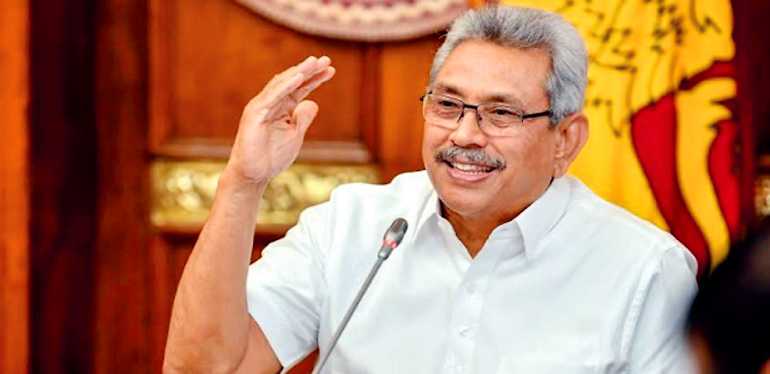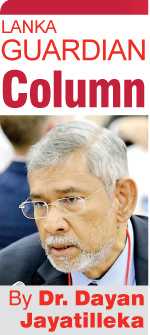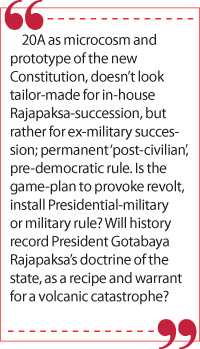Saturday Feb 21, 2026
Saturday Feb 21, 2026
Thursday, 1 October 2020 00:30 - - {{hitsCtrl.values.hits}}

Since the President has taken responsibility for the draft 20th Amendment and chosen not to incorporate the revisions suggested by a panel drawn from his own Cabinet and appointed by his Prime Minister, one must conclude that the undiluted draft 20th Amendment accurately mirrors his thinking
“If the public do not have access to remedy a grievance against the unlawful exercise of powers by an all-powerful President the only remedy will be to take arms against the State” – Bar Association of Sri Lanka Committee Report on the 20th Amendment (5.1, p3)
A rousing accolade from a great friend blew a hole below the waterline of the case for scrapping the 19th Amendment and implanting the risky 20th Amendment.
The Shanghai-based YICAI Research Institute, part of the YICAI Media Group, China’s largest financial media conglomerate, listed Sri Lanka the second-best performer in the World Survey on Pandemic Control, in a survey of 108 countries. China came in first, while Sri Lanka out-performed South Korea (4th), New Zealand (8th), Vietnam (9th), Japan (18th) and Germany (23rd). (http://www.newswire.lk/2020/09/26/sri-lanka-rank-2nd-china-rank-1st-in-world-survey-on-pandamic-control-conducted-by-chinese-institut/)
Sri Lanka’s performance as the world’s No. 2 corona-beater, just behind China as No. 1, was achieved under the leadership of President Gotabaya Rajapaksa while the 19th Amendment was/is still in place, just as President Mahinda Rajapaksa’s historic victory over the LTTE was achieved with the 17th Amendment in place.
So, what’s the problem with the Presidency under the 19th Amendment that cannot be rectified by careful readjustment? Why run the grave risks of the 20th Amendment?
Presidential doctrine
While the 20th Amendment is debated, a process commences in the world’s pre-eminent power, which shows how democratic presidencies work, including in the place the presidential system was carefully founded.
The US President is the most powerful person on the planet. Yet, his nominee to fill the vacancy in the US Supreme Court will be grilled, with nationwide—actually, worldwide—transparency by the US Senate. So why would our President, a former US citizen, wish to make the process of appointments—not just nominations—a Presidential preserve, with only ‘observations’ made by a legislative committee?
Moreover, why would a President whose family has been represented in the country’s Legislature from 1931, present a Constitutional amendment that devalues Parliament to a level of powerlessness it has never been reduced to before?
The Duma in President Putin’s Russia has more importance and influence than the post-20A Sri Lankan Parliament would under President Gotabaya.
So where does such an autocratic, President-as-Emperor model derive from? What is the source of influence/inspiration?
The President’s philosophy of the state was evidenced and encapsulated in his path-breaking, and inimitably emphatic, declaration (Sept 25th, Haldumulla, Haputale, Badulla) widely seen on TV news, that: “…after the President says it, that is the circular! A circular is what the President says! What else is there beyond that? That is what is meant by Executive President! If not [complied with], I shall take stern action against the relevant official.”
So, a verbal order of the President is a circular. Universally, however, a circular is an instruction citing codified regulation and rule. The President’s idiosyncratic interpretation takes us back millennia to the age of absolute monarchs, emperors even, before the written formalisation of rules and regulations, i.e. stable, institutionalised order. By the logic of his doctrine there would no need for civil service exams as instituted by the Chinese mandarinate in accordance with Confucian doctrine. Max Weber explained that a rules-based framework is the evidence of a rational order, and is the hallmark of “legal-rational authority”.
The high growth rate and the transformational Mahaweli scheme of the Jayewardene years, the Premadasa economic turnaround and social upliftment programs, and Mahinda Rajapaksa’s post-war growth rate (second only to China), were administered by top public servants working within a formal framework of rules and regulations. President GR displays zero tolerance for an evolved, written, rules-based domestic order which is hallmark of political evolution, social progress and civilisation itself.
How can there possibly be a rapid modernisation of Sri Lanka without, and while disembowelling and throwing overboard, a most basic feature of modernity, namely a rational, transparent rules-based state framework and order, replacing archaic absolutism? How can there be a level playing field when the rules can change according to arbitrary Presidential fiat?
De-regulation, the cutting away of red tape, is helpful and necessary for economic development. Arbitrariness and spontaneous verbalisation by the ruler are not. The Singapore success is based on a rational, rules-based, transparent, level playing field and a highly-educated public administration, originally inspired by the elite Ceylon Civil Service (which Neville Jayaweera wrote that President Premadasa wished to restore).
Since the President has taken responsibility for the draft 20th Amendment and chosen not to incorporate the revisions suggested by a panel drawn from his own Cabinet and appointed by his Prime Minister, one must conclude that the undiluted draft 20th Amendment accurately mirrors his thinking.
 |
 |
BASL’s verdict
Just how far that thinking is from a Middle Path, and just how extreme, how far to the radical Right it is, is most transparently seen in the critical observations of the Bar Association of Sri Lanka (BASL).
Nothing could be more shockingly revelatory than the fact that the draft 20th Amendment removes the clause which states that it is the duty of the President to ensure the Constitution is respected and upheld. The BASL report observes that:
“…the Rule of Law necessarily requires [that] the President, conferred with wide ranging powers under the Constitution should have the duty to uphold the Constitution...Repealing such a provision is detrimental to the Rule of Law.”
“…new Article 33 which retained the provisions of Article 33(2) of the Constitution without the reference to the duties imposed on the President. The Committee is of the view that deleting the word ‘duties’ is not conducive to the Rule of Law.” (P3)
Does the President, who asserts that whatever he says has the status of a circular (the ignoring of which will be punishable by him), simultaneously think that he has no duties in relation to the Constitution? What could conceivably be more basic a duty of the President than to uphold and ensure respect for the Constitution? What does the President think he is bound to uphold instead? Values which are cherry-picked from the Constitution but not the Constitution as a whole? Values that are extra-constitutional? His 2019 electoral mandate as interpreted by him? Surely upholding an election mandate which derived from an existing situation and is therefore inherently temporary, however important, is subordinate to the upholding of the Constitution? Why would a Constitution be termed the Basic Law?
Is the (President’s) assumption that the President—this President or any successor ex-military President—is above the Constitution and exempt from the duty of respecting and upholding it?
If the President does not have the duty of upholding the Constitution, whose duty is it? Everybody else’s but the President’s?
What would you call a system in which the President, the First Citizen, is the sole exception to the duty of upholding the Basic Law, the foundation and framework of the State; a duty which is binding on all other citizens, including those who elected him to his exalted post—while on the other hand, his verbal edicts are elevated to the status of an official circular, i.e. a formal, written instruction?
Recipe for revolt
The most drastic of the implications and consequences of the draft 20th Amendment have been clearly set out by the BASL Committee’s report in terminology that an ex-military officer may think has been authored by a wild-eyed subversive to the left of the Frontline Socialist Party (FSP), but any student of politics and/or the law would recognise as a classically Lockean formulation.
“The Committee is of the view that no person should be above the law. The President in particular being the repository of substantial powers under the Constitution should be held accountable for the exercise of those powers in accordance with the Constitution. No person is above the law and to grant absolute immunity from suit is contrary to all known principles of the Rule of Law. If the public do not have access to remedy a grievance against the unlawful exercise of powers by all powerful President the only remedy will be to take arms against the State.” (p3)
The original argument of John Locke sets out the conditions in which the people would have no alternative but to legitimately invoke the inalienable right of rebellion and in which rebellion would be legitimate.
The BASL, hardly a body of Bolshevik orientation, and one of the staidest of civic associations, is correct in stating that the elevation of the ruler above the Rule of Law, shuts off all legal pathways to the citizenry against injustice committed by the ruler. This is a crucial criterion which defines the Gotabaya Presidency as absolutist, going way beyond the authoritarian Jayewardene Presidency, since the citizenry had the Fundamental Right under the 1978 Constitution, to file a case against the executive, as represented by the Attorney-General.
If the ruler is transformed into a despot who is above the law; if the fundamental right of the citizen to appeal to the law against the arbitrary actions of the ruler is abolished, this would activate the fundamental right of revolt, rebellion and revolution, deep-rooted in a thick body of Natural Law/Natural Justice doctrine dating back millennia. Such is the reminder-cum-warning very responsibly given by the Bar Association of Sri Lanka in the Report of its Committee.
President Gotabaya Rajapaksa is aware of the massive rebellions that arose during the Jayewardene Presidency, since he served as a combat officer against both of those rebellions. He must be aware of the SLFP, co-founded by his father and led by Madam Sirimavo Bandaranaike for decades, agitating, with Mahinda Rajapaksa at her side, against the Presidential Leviathan. He must know that the presidency in that primitive shape and enormous form, either provoked resistance and rebellion, or served as a tempting target, or at the very least, failed to prevent such rebellions.
The legitimacy of our State must not be confused with the legitimacy derived from the electoral mandate of whoever happens to be the president. If the latter were the sole or superior criteria, then every president should be accompanied by his/her customised Constitution, or declare that what the executive president says constitutes the Constitution.
Ticket to tyranny?
The legitimacy of our State flows in large part from the integrity of our elections and the independence of the Judiciary. If the authority that manages elections is not free from the ruler, and the ruler controls all aspects of the appointment of judges, then the legitimacy of the system and processes become questionable within the international community (it has already begun with the Commonwealth Judges Association), and soon enough, the Lankan citizenry – because the even local Fox News “can’t fool all of the people all of the time”.
The BASL Committee Report makes clear just how the draft 20th Amendment traduces both the Judiciary and the electoral system.
“6.4 …Article 4 of the Constitution provides that the judicial power of the people shall be exercised by Parliament through Courts, Tribunals and Institutions created and established or recognised by the Constitution, or created and established by law. In these circumstances, it is imperative that the executive should not have control over the appointment of Judges or the Judicial Service Commission. Indeed, if there is one arm of Government that should have control it is Parliament and not the President.”
“6.5 The Committee is of the view that as regards the appointment of Judges of the Supreme Court and the Court of Appeal the President should not have absolute control over the appointments.” (p5)
The hollowing-out of the credibility of the electoral mechanism and process is fundamentally consequential:
“6.7 The Elections Commission is fundamental in ensuring that the inalienable sovereignty of the people is not affected in any way. The Elections Commission is responsible for the conduct of the election of the President. It is inimical to the Rule of Law that the President should have control over the appointment of members of the Elections Commission which conducts its own election.” (p5)
Eyebrows will inevitably rise when one takes into account (pun intended) the changes to Public Finance—what with Mihin Air as one of the 120 enterprises which will escape the Auditor-General’s scrutiny.
“23.1 The control of public finance by Parliament is fundamental to representative democracy… The Finance Commission and the Auditor-General are necessary and essential to ensure Parliamentary control of finance... The Auditor-General ensures that the funds are utilised according to law. To grant the President control over these appointments would diminish Parliamentary control over finance. It is inimical to the Rule of Law that the President should have control over the appointment of members of the Finance Commission and the Auditor-General.” (p6)
The vesting of the appointment of the Secretary-General of Parliament as well as the Attorney-General in the President, loads the dice (or sews-up the system) still more.
“6.11 The Secretary-General of Parliament is the head of the Parliamentary staff. He performs critical functions in support of the Legislature. The control of appointment of the Secretary-General by the President is inimical to the Rule of Law...”
“6.12 The Attorney-General is conferred wide ranging powers under the Constitution. It is necessary for the Rule of Law that one organ of Government should not have control over the office of the Attorney-General through the appointment of the Attorney-General…” (p7)
When the Bar Association of Sri Lanka or of any country for that matter, deploys the T-word—“tyranny” —in a studied, scrupulous evaluation of a constitutional change, we have to wonder where the ruler is taking the country and what the consequences will be:
“22. The Committee is of the view that the proposed Article 122 is inimical to the Rule of Law administration of justice and the sovereignty of the people. Particularly in circumstances where judicial review of legislation is not available it would lead the way to tyranny.” (p16)
The BASL Committee report takes exception to the crippling of Clause 40 that brings the state sector, public enterprises and those in which the state holds 50% or more shares, under the scrutiny of the Auditor-General (p 17). It takes a decidedly critical view of the proposed abolition of the Audit Services Commission, the Procurement Commission and the removal of the stipulation that the Auditor-General should be a qualified accountant (p18). How can a regime allegedly committed to professional expertise, justify the removal of a necessary professional qualification for the post of the Auditor-General?
Why wouldn’t a leader be responsive when criticism of the draft 20th Amendment come from unions and associations supportive of the Government e.g. the GMOA, the Nurses Union, and the Ceylon Bank Employees Union?
20A as microcosm and prototype of the new Constitution, doesn’t look tailor-made for in-house Rajapaksa-succession, but rather for ex-military succession; permanent ‘post-civilian’, pre-democratic rule. Is the game-plan to provoke revolt, install Presidential-military or military rule?
Will history record President Gotabaya Rajapaksa’s doctrine of the state, as a recipe and warrant for a volcanic catastrophe?